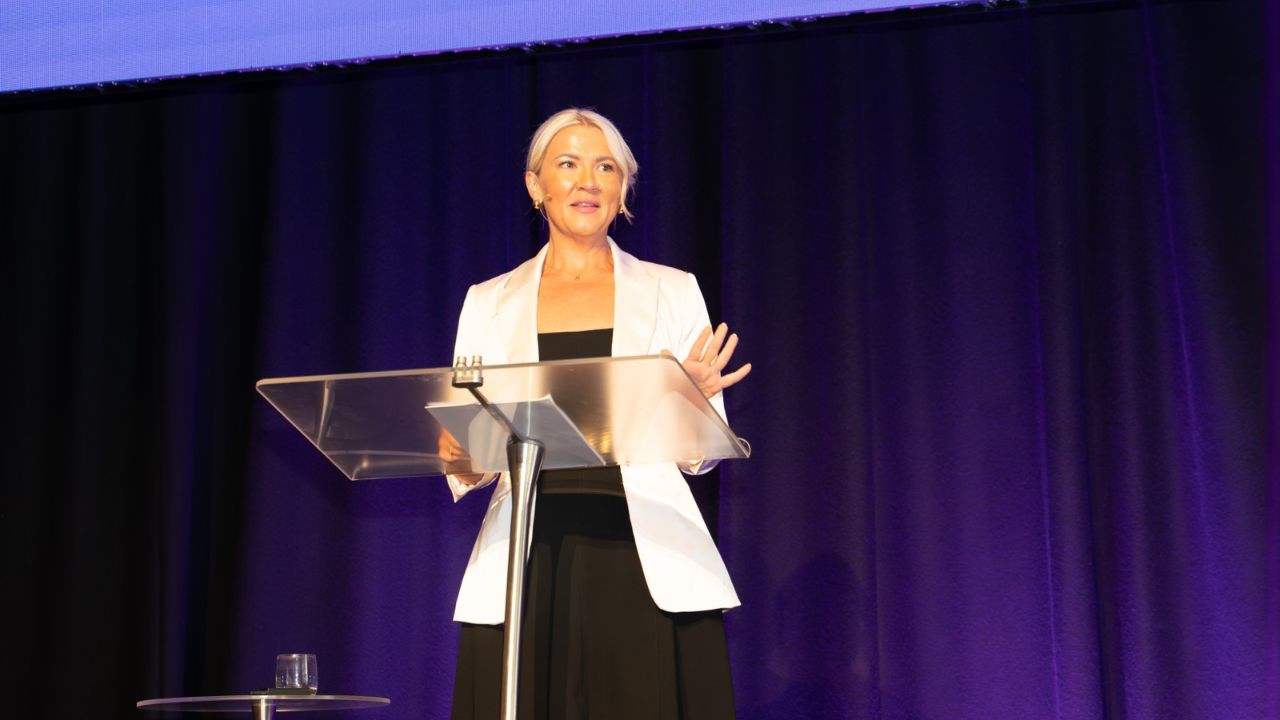When Tamara Weight took the stage at PM/One, she admitted something straight away. “I’ve attended a lot of conferences and no one’s ever let me on stage before, so this is a first.”
But as partner at Harcourts Kingsberry in Townsville, overseeing nearly 3,000 residential properties with a team of 34 from a single office, Tamara clearly had insights worth applying.
What followed was a sharp and refreshingly honest account of how her business not only achieved consistent growth, but retained both clients and staff in a market that has tested the endurance of many.
“We’re not doing anything revolutionary,” she said. “It’s smart, consistent execution with a willingness to adapt.”
Tamara’s property management department runs on structure and clarity. They’ve got 15 property managers with their own portfolios, supported by assistants, a four-person new business team, leasing, compliance, reception, two team leaders and a floating property manager.
“Everyone knows where their job starts and ends,” she said. After their largest acquisition to date in 2023, Tamara knew the old setup wouldn’t cut it.
“If we didn’t put the right support in place, we’d lose those new managements just as quickly as we gained them.” The team leaders now handle staff onboarding, complaints and escalations, while the floating PM covers portfolios when someone’s on leave, so, as Tamara put it, “people can actually have a break without coming back to chaos.”
That foundation has allowed the business to scale in a way that’s deliberate and sustainable. One of the biggest drivers of that growth is the new business team, which signed 665 new managements in 12 months—nearly two per day.
“We pay them well, resource them properly, and let them run their own show. I’m not a micromanager.” The team includes one admin-focused BDM, one classic networker, and two support staff who handle both in-office and out-of-office tasks. Tamara said the model has held up under constant change—marriages, maternity leave, family loss, even a baby arriving six weeks early—and still, the numbers kept rolling in.
A big reason for that is the strength of their relationships. Back in 2020, a buyer’s agency identified Townsville as a growth hotspot. Tamara’s team acted quickly, offering pre-purchase inspections, maintenance recommendations and rental appraisals, before the buyers had even settled.
“They didn’t want a referral fee,” she said. “They just wanted the service. One buyer’s agent ended up giving us over 200 properties.”
That evolved into an off-market Tuesday email, where sales agents could submit listings that were shared exclusively with investor clients, with the understanding that the management would return to the office.
“It became so talked about it was popping up in forums,” she said.
“It also helped build trust between our sales and PM teams, which made a huge difference.”
Despite all that growth, Tamara said there came a point where the business was leaking clients out the back door.
“Every time we got a termination notice, it killed me.” They reviewed the data and the reasons were clear: rent wasn’t being increased enough, routines were inconsistent, communication was lacking, compliance was patchy, and staff changes weren’t helping.
One of the simplest, most effective fixes was creating a Rent Review Committee made up of BDMs and team leaders. They review all upcoming lease renewals and set the target increases, removing emotion and improving consistency.
“The property manager can now say, ‘Hey, I don’t set the price, but here’s what’s been recommended.’” That single change resulted in an extra $128,000 in rent collected in the first month, plus around $10,000 in additional management fees.
Routine inspections were another major issue.
“We had 16 property managers doing things 16 different ways, or not at all,” Tamara said.
Reports were missing. Maintenance wasn’t being actioned. It was, in her words, a disaster. So they created a dedicated inspections team of three former PMs and rebuilt the entire schedule suburb by suburb.
“Now when an owner asks for a report, it’s there. The difference has been night and day.” It also allowed their PMs to stay in the office and focus on building relationships, not drowning in catch-up admin.
Compliance was outsourced to two virtual assistants.
“I was slow to adopt VAs, not because I didn’t like the idea, but I hadn’t found the right fit. But for this? Just shut up and take my money. Worth every cent.”
In March, they introduced a nine-day fortnight across the team, reducing hours to 67.5 per fortnight without asking staff to compress days or work longer.
“We got really clear about expectations, set rosters and gave people checklists. Productivity has gone up, people are fresher, and I’ve got two experienced PMs waiting for a job to open up. That’s never happened before.”
Underpinning all of this is Tamara’s philosophy on leadership: “It grinds my gears that property managers aren’t valued the way they should be, given the stress of the job. I saw something that said your manager has more impact on your mental health than your therapist. That really resonated with me.”
Her final advice was simple: “Don’t just hope new business comes to you. Build systems that make sense, invest in your people and keep adapting. What works today might not work tomorrow.”

